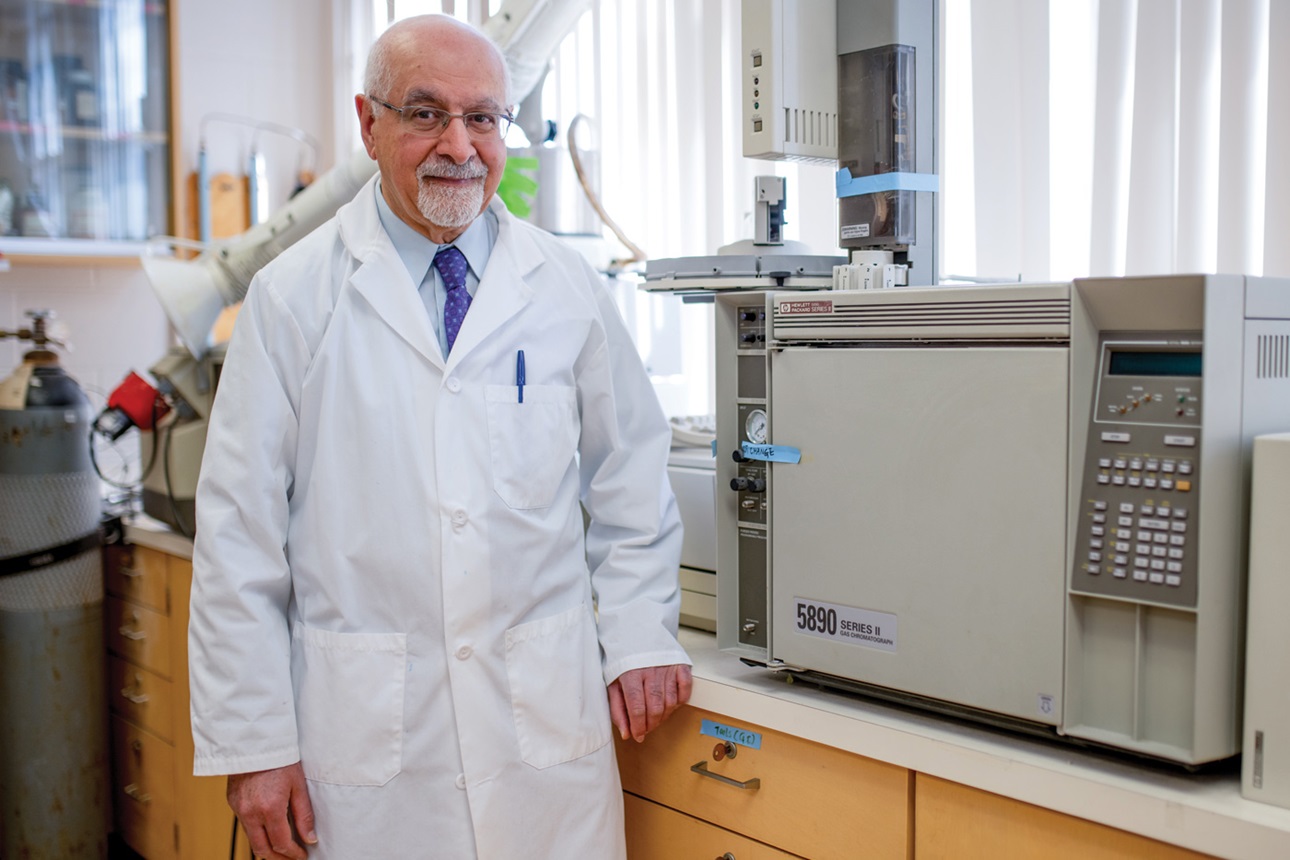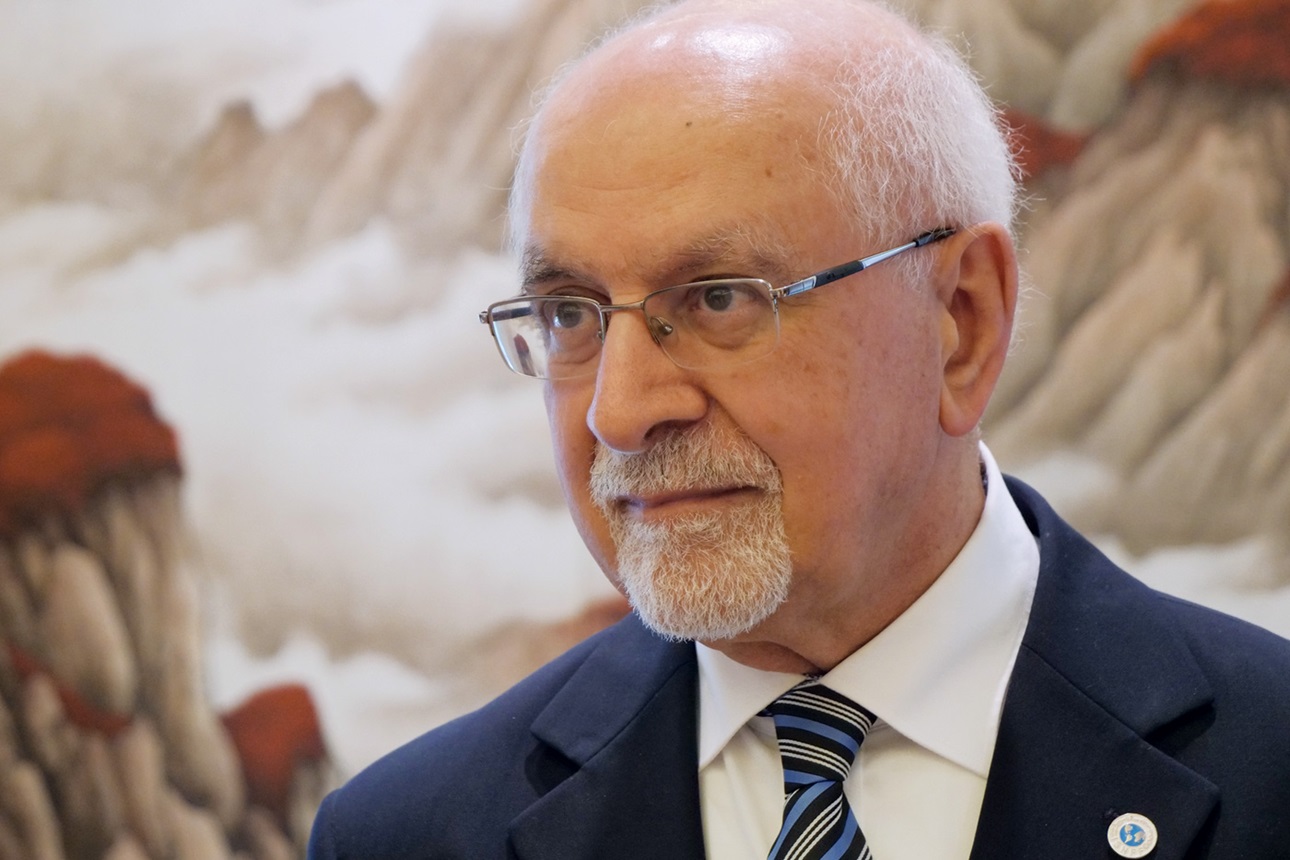A Lifetime of Discovery
Memorial University of Newfoundland’s Fereidoon Shahidi, the recipient of IFT’s 2023 Lifetime Achievement Award in honor of Nicolas Appert, talks about the need for compelling data in the nutraceutical and functional food space, as well as the importance of giving students room to make their own discoveries.

Photo courtesy of Fereidoon Shahidi
It may surprise you to learn that Fereidoon Shahidi did not initially plan to pursue a career in food science. Despite the fact that Shahidi is an internationally renowned scholar and a literal pioneer in the nutraceutical and functional food space, he earned his doctorate at McGill University in physical organic chemistry. He likely would have continued in that field if not for some colleagues who came to him for help when he worked as a research associate and lecturer at the University of Toronto’s Department of Chemistry.
“A group in food engineering, which was part of the Chemical Engineering Department at the University of Toronto, wanted to basically mimic the structure and properties of nitrite in the curing of meat. I quickly found, within a few months, that there was a way to do that—and we then went on to perfect it over the years,” he says. “At first, I had no intention of joining them. I just wanted to be helpful. But once I had the solution, it changed my direction. I went into the food area and never looked back.”
In the decades since, Shahidi has made remarkable contributions in both basic and applied research into food lipids and phenolic antioxidants, significantly advancing the fields of food, nutrition, and agricultural science. Today, he is a university research professor and distinguished scholar in the Department of Biochemistry at Memorial University of Newfoundland, with an impressive research portfolio that includes discoveries involving lipids, proteins, polyphenols, natural antioxidants, and oxidation control in health and disease.
Food Technology recently spoke with Shahidi, winner of the 2023 IFT Lifetime Achievement Award in Honor of Nicolas Appert, about the bigger picture research questions that have governed his investigations as well as the importance of providing compelling data to support the development of innovative nutraceutical and functional food offerings.
You’ve had a prolific research career. What are some of the bigger picture research questions that have driven your investigative work?
Waste and utilization are really the driving forces in our work. The most important question has been how to fully utilize resources and eliminate wastage of food, whether you are talking about waste from the farm or from processing discards. For example, if you look at seeds, from cereal grains or legumes, they all have an outer skin there to help protect the plant. And what do we do with them? Most of the time, we remove these layers that are full of defensive material that help protect the plant from the herbivores. We throw them away or give them to animals. But these skins are also full of phenolic compounds. There are all these goodies there, and we can make good use of them.
You see the same thing with seafoods. With fish, after we remove the main filet, we just throw away the head, the bones, the internal organs, and all the rest. But there is an opportunity to have full utilization—what we now refer to as upcycling of the circular economy. This is not only important to protect our food supplies, but there are concentrated bioactive compounds in many of these things we waste—and we can make good use of them to promote better health and well-being.
There are so many different bioactives with specialty purposes. By hydrolyzing the proteins from the leftover materials we often throw away, not only can we reduce waste, but we can also help the farmers and harvesters and the greater agricultural economy.
We are also looking at things like “best before dates.” In Canada alone, we throw away $30 to $40 billion of food each year because of “best by” dates—and despite that date printed on the package, in most cases, the food is still good. We need to create active packaging—the sort that tells us the real expiration date for our food—and no longer rely on “best before” dates.
You are the principal founder of the International Society for Nutraceuticals and Functional Foods, as well as for IFT’s Nutraceutical and Functional Foods Division. From your vantage point, how has this field evolved over the past decades?
The field has evolved around the fact that people want to have healthy food—food that will help them live longer and stay healthy while they are on this planet. But we have to show these products have physiological benefit. As the statistician says, in God we trust, all others must produce data. So, as a field, we have to bring the data that proves the physiological benefits of these products. This has been a challenge, but having such a division to bring us together can help overcome it.
Sensory properties are another challenge. Nutraceuticals are often used in a medicinal form. There, the sensory properties are not as important as they are in functional foods. We have blueberry extract, we have cranberry extract, and maybe it doesn’t taste the best even if not encapsulated, but we don’t mind it. However, with functional foods, we must pay attention to those sensory properties. Because if a food doesn’t taste as good as what we expect or what we are used to, we are not going to eat it. We are not going to buy it. This has made the jump into functional foods a bit more difficult, and even as there’s a push to go to plant-based foods, we need to carefully consider and find new resources to help us find different plants and materials that will taste good by devising unique formulations. That’s another place where working together can help us move forward.
What inspired the founding of IFT’s Nutraceutical and Functional Foods Division in 2000? What were your goals for the group, and what involvement do you have now?
What we call food bioactives today were once known as antinutrients, at least some of them. As we found important pro-health components, we needed to find ways to support research and data to encourage their use. In order to get to full utilization and zero waste—what we now call circular economy or upcycling—we needed to bring together scientists to provide evidence of physiological benefits of these compounds. We were at a point then where we had new tools that could help us to do that. Today, we have a lot of -omic technologies that are helping us gather the evidence we need to do our work.
After founding the division, I also served as its chair. Since then, I’ve served on its leadership team, as well as on its student competition panel. I’ve also been a luncheon speaker and worked on programming, abstract, and session selection teams.
After four decades of groundbreaking research looking at a variety of different bioactive compounds, what findings have surprised you most?
A lot of these phenolic compounds are very hydrophilic. That means, in order to get to the mitochondria in cells that require protection from oxidation, these antioxidants or phenolic compounds have to pass through the bilayer; otherwise, they have minimal accessibility and bioavailability. One thing we did was to lipophilize them. That is, by conjugating them with fatty acids so that they become more lipophilic and penetrate through the bilayer to get to the mitochondria and prevent oxidation. We did this with one of the green tea polyphenols, epigallocatechin gallate (EGCG). In collaboration with our colleagues in Taiwan, we found that when we conjugated it, and attached it to docosahexaenoic acid (DHA) and eicosapentaenoic acid (EPA), bioactive lipids that exist in fish oil, we were able to arrest tumorigenesis in a mouse model. Working with our partners in Dalian Polytechnic, we demonstrated that these conjugates are released once consumed and ingested. This is just one example of what we’ve found. There are many other discoveries we’ve had in the laboratory, and I’m very happy that we’ve been able to contribute to the advancement of food science and technology in a way that both the health of people is better addressed and the industry is better equipped to meet the challenges they face.
What are you working on now?
We are working on several studies in different areas. Some of them are with marine algae and certain seafoods and their byproducts. Others are working with plants and fruits from South America so we can find out how we can best make use of them. We are also working with different types of oil with medium-chain fatty acids to see if it may be possible to make use of them to develop designer lipids for different applications. Again, we work with the byproducts of legume husks to see how we can best make use of them. And, of course, bioactive peptides remain an area of active research so we can better understand how to make use of them to develop better designer foods or food ingredients. Our goal is not only to help further research and development, but also to help improve the health of consumers and the greater needs of the industry.
You are also well known as a mentor and educator. What have you learned from training the next generation of scientists?
Number one, I’ve been lucky to have very talented students. That’s been very important. One thing I tell every student that walks in the door is that we are all equal. We do different jobs, but you are equal to me, you are equal to your colleague in the lab, and you are equal to the cleaner outside. No matter what our job may be, we should excel and do our best.
I also have kept an open-door policy. My students can come in to talk to me, but I also give them plenty of elbow room so they can use their own imagination. And I tell them, just because I’m your professor, it doesn’t mean I always have the best answers to every problem. If you have fresh ideas, speak out. Because you may be coming to the problem with a fresh mind. Your mind may not be cluttered with unnecessary information, and you can help us move forward. I think it’s important to be honest with students, tell them everything, and make them think. And wherever we can facilitate learning and use the best strategy and techniques to make it possible for them to move ahead with their imagination, we can help them to succeed and reach their ideals to make something of themselves.
It is always rewarding and wonderful about seeing your students become better than yourself. I am really proud to see the people I’ve mentored achieve so much, and, hopefully, our work has also contributed to the health and well-being of the people. My former students work in 20 or more countries. They hold academic, industrial, and government positions. They work as professors, researchers, vice presidents, ministers, and deans as well as industry leaders. I’ve been privileged to have mentored and worked with them. They are my colleagues, and I’m very proud of what they’ve accomplished. It’s important to me to see them succeed since I’m no longer doing research at the bench myself. I give ideas, I supervise, I mentor, but it’s my students who now provide the real backbone of the scientific work we disseminate.
You are no stranger to accolades. You’ve received dozens of awards over the course of your career. How does it feel to have been awarded the IFT Lifetime Achievement Award in honor of Nicolas Appert? What does it mean to you?
It means I’ve done something my colleagues and peers have found important and that has contributed to the advancement of science. It means a lot to me. It’s not just what I think I may have done—it’s what others think of what I’ve achieved. Receiving such a prestigious honor from IFT is recognition that my peers see our contributions as meaningful and worthwhile. I’m very glad they do.ft








